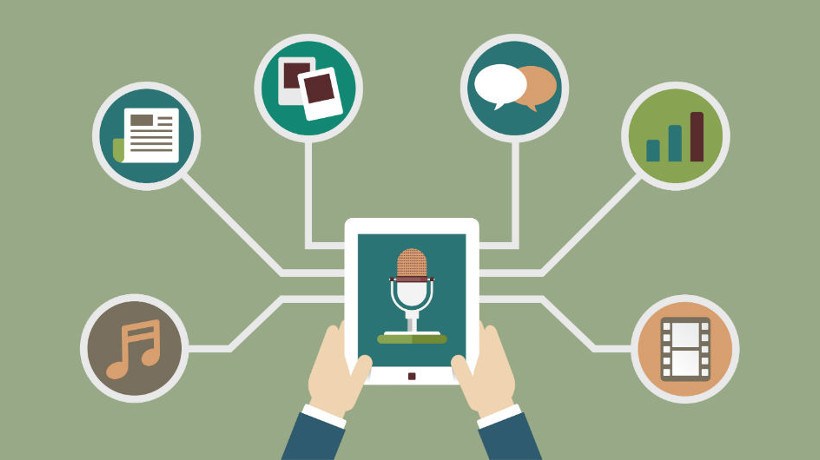How To Produce eLearning Podcasts
There are instances when yours online learners need easy access to information, but they don’t have easy access to the internet. Podcasts, in general, are portable and practical. Rather than having to stream online videos and tutorials, online learners have the opportunity to download eLearning podcasts that pertain to their goals. Creating effective eLearning podcasts involves high quality audio, careful planning, and in-depth knowledge of the subject matter. Here are the 7 best practices to produce podcasts for your eLearning course.
1. Target Your Topic
The first thing you need to produce eLearning podcasts is a targeted topic that offers a variety of discussion points. Analyze the subject matter and pick a few standout concepts or ideas, then create a branching mind map for each. For example, if you are creating an eLearning podcast series for developing soft skills, you should choose a few skill sets that are at the top of the list. Think of all the main talking points for the first soft skill, such as the real world benefits it offers, how to build the skill, and why your online learners need it. You should have enough information to produce at least a 10-to-15 minute eLearning podcast. It's important to focus on a single topic in order to avoid cognitive overload and learner confusion. The goal is to explore all of the key ideas and concepts in one episode, rather than just skimming the surface of several topics.
2. Create A Plan Of Action
Before you turn on the mic you should create an eLearning storyboard or a general outline of what you'll cover and how much time you'll spend on each sub-topic. Don't make it too structured, because you want the eLearning podcast to seem conversational and casual instead of scripted. If you are hosting an eLearning podcast series, create a plan of action for your channel. For example, develop a schedule for what topics you'll cover over the course of the next few months, including upload dates for each installment. Hold a brainstorming session with your eLearning team to get their input and meet with Subject Matter Experts to brush up on the topic.
3. eLearning Podcasts And Social Media Go Hand-In-Hand
eLearning Podcasts are engaging, but most learners will be listening to them on their own. Thus, they aren't the most typical example of social learning activity. However, you can integrate social media into your eLearning strategy, such as Facebook groups or Twitter hashtags, to make your eLearning podcasts even more beneficial. Encourage your online learners to leave comments while they are listening to the eLearning podcast and share their opinions about the topic. If you are hosting a live eLearning podcast, online learners can even leave their questions for you to answer during the eLearning podcast event.
4. Invite Interviewees, Experts, And Guest Hosts
You want to cover a topic in your eLearning podcast but you know that you're not the most qualified person for the task. Why not invite an expert to guest host the eLearning podcast? Another option is interviewing a Subject Matter Expert who has more experience in the field. Even if you are well versed on the topic, having someone else contribute can offer your online learners a different perspective and improve their comprehension. Introduce them at the beginning and mention their qualifications so that your audience knows they are offering real value. Search LinkedIn groups or other professional networks if you have trouble finding an expert to interview. Give them some incentive to participate, such as promoting their website or book during the eLearning podcast event.
5. Find The Right Recording And Editing Tools
You need a good quality microphone, audio recording software, and editing tools to create a winning eLearning podcast. White noise in the background will only distract your audience from the online discussion. There are a number of free or low-cost audio production tools that you can use to polish your cast, even if you don't have any prior experience. When in doubt, look online for pointers on how to use the software or view vendor tutorials.
6. Keep Episodes Brief But Fact-Packed
eLearning podcasts that are too short won't provide listeners with enough information. On the other hand, eLearning podcasts that are too long won't be easily digestible. A good rule of thumb is to keep your eLearning podcasts between 10-to-15 minutes in length. Keep in mind that online learners will be listening to your eLearning podcast during the "free time", so it should fit conveniently into their schedule. If you are covering a topic that's more in depth you may want to consider chunking it into 2 or 3 episodes. It's also essential to give them all of the necessary takeaways. Include the facts, stats, and ideas that they need to achieve their goal.
7. Find Your Voice
Your eLearning podcast should sound organic and conversational. If you script every line beforehand your online learners will hear it in the tone and pace of your voice. Think about your target audience. What is their experience level of background? Are they seasoned professionals who know all the industry jargon, or are they newcomers to the field? Are they going to understand the colloquialisms that you're using? Do you need to use an authoritative tone, or should you go for a more natural speaking voice? Find your voice before you begin recording so that you remain consistent throughout the entire eLearning podcast.
Keep this best practice tip sheet on hand when creating your eLearning podcast. If you’re still a bit hesitant about producing your first recording, conduct a focus group to get feedback and see how your eLearning podcast is received. This allows you to identify areas that you may want to improve before your official launch.
An eLearning podcasts is a highly effective microlearning tool. Read the article 7 Tips To Create Memorable Microlearning Online Training to discover how to create memorable microlearning online training experiences that are sure to stick.






